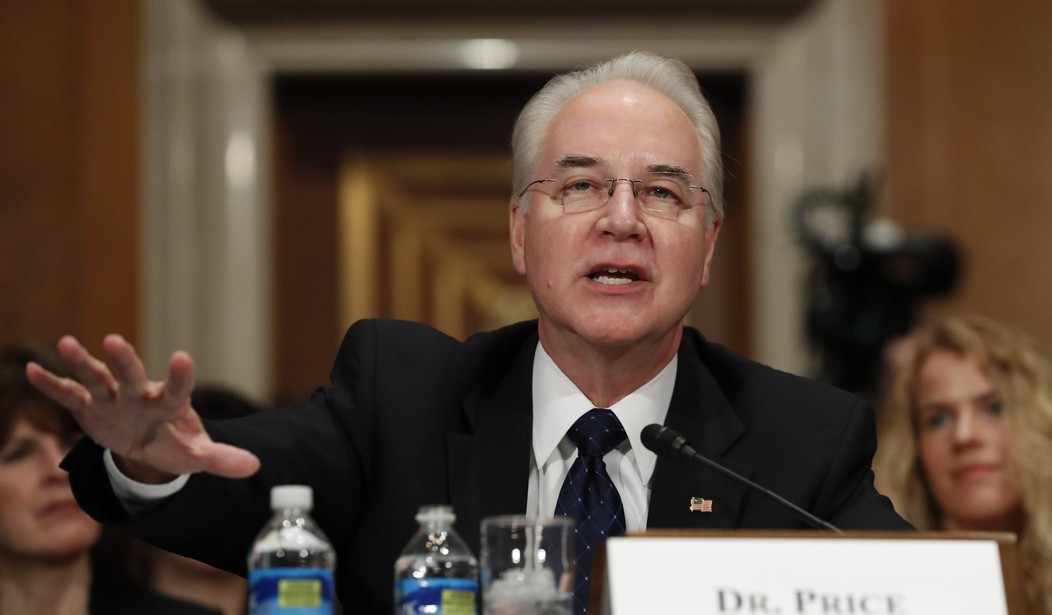Rep. Tom Price, M.D. (R-Ga.) told Sen. Susan Collins (R-Maine) that he is as worried about the 20 million people who don’t have health insurance in America despite the Affordable Care Act as he is about maintaining coverage for those who depend on Obamacare.
“Why is that?” Price said, referring to those who don’t have coverage. “I think it is because of the structure of the Affordable Care Act.”
Price, the Trump administration’s Health and Human Services secretary nominee, faced nearly four hours of questions from the Senate Committee on Health, Education, Labor & Pensions today during his confirmation hearing.
Along with a debate over Obamacare, Price also faced allegations that more than $300,000 in stock investments were a violation of House ethics policies.
He refuted the charge.
“Everything that we have done has been above-board, transparent, ethical and legal,” Price told the committee, as he reminded them that all the information they held regarding his finances were provided by him.
Price made no secret of his distaste for Obamacare. The Republican, who is also an orthopedic surgeon, recalled his patients becoming angry when they realized someone else was in the examination room — insurance companies and the government.
Committee Chairman Lamar Alexander (R-Tenn.) supported Price’s position on Obamacare during his opening remarks.
Alexander equated the ACA to a collapsing bridge that needed to be replaced before someone got killed.
“If a bridge in your community was collapsing, you would build a new bridge or several bridges to replace it – and then close the bad bridge,” Alexander said.
Alexander and Price agreed a substitute plan should be offered before the end of February.
Price has not only been a vocal opponent of Obamacare, but a longtime champion of the drive to repeal and replace the ACA.
He proposed the Empowering Patients First Act in 2013.
“We know and have already seen that interference from Washington is not the solution,” Price said when the proposal was introduced. “Instead, the Empowering Patients First Act returns healthcare decisions to patients, families and doctors, so that they, not government, can make choices rooted in compassion and common sense.”
“Choices, access and cost are at the center of where we should be putting our attention.” Price said again today. “Healthcare insurance doesn’t do you any good if you can’t afford it.”
However, he also said that nothing in the ACA would be repealed unless a replacement was ready to take its place.
“Nobody is interested in pulling the rug out from under anybody,” Price said.
Sen. Al Franken (D-Minn.) said Price’s proposal left no doubt as to where the Georgia Republican stood in the healthcare debate — on the side of healthcare providers.
“I am very frightened by what you are planning to do and so are millions of Americans,” Franken said. “This is going to unravel something (ACA ) that has given a lot of Americans peace of mind.”
Price responded by saying Franken’s attitude was what “makes it difficult to reach a solution.”
Price admitted the Minnesota Democrat’s concerns were valid. But he also said Franken’s conclusions were “absolutely incorrect.”
“I understand the reason he (Franken) is doing it,” Price said. “It’s political.”
However, much of the questioning at his nomination hearing focused on Price’s stock trades.
Sens. Franken, Tammy Baldwin (D-Wisc.) and Elizabeth Warren (D-Mass.) wrote a letter to Alexander asking that Price’s confirmation hearing be delayed pending an ethics investigation.
“Since Congressman Price’s nomination, investigative press reports have revealed that the congressman traded more than $300,000 in shares of health companies while simultaneously sponsoring and advocating for legislation that could potentially affect those companies’ stocks,” the senators wrote in the letter. “In fact, since 2012, Congressman Price has bought and sold stock in about 40 healthcare, pharmaceutical, and biomedical companies.”
Alexander refused their request. Democrats took their case to the committee hearing.
Sen. Patty Murray (D-Wash.) fired the first shot by asking Price if he had purchased stocks in a small Australian biotech company, Innate Immunotherapeutics, after receiving a “stock tip” from Rep Chris Collins (R-N.Y.).
She said Collins had been heard bragging about “making millions” for his friends by telling them about the company.
Price admitted he and Collins had discussed the company but their conversation should not be characterized as a stock tip.
Price told Franken, who questioned his investments in tobacco companies, that a broker handled his investments.
“I have no idea what stocks I held in the ’90s or even now. All of these decisions are made through mutual funds or pension plans,” Price said.
Franken, who would later be told by committee Republicans that a mutual fund that he holds invested in Phillip Morris, said that was hard to believe.
Sen. Orrin Hatch (R-Utah) said that even asking Price about his investments was “hypocritical.” He speculated that many on the committee had also traded in healthcare-related stocks.
Sen. Rand Paul (R-Ky.) was even blunter. He said that questioning Price’s motives and honesty was “insulting.”
At the end of the four-hour session, none of it mattered much.
Alexander explained at the beginning of the hearing that the Senate Finance Committee would have the final say on Price’s nomination.
Price is scheduled to appear before that panel on Jan. 24.









Join the conversation as a VIP Member